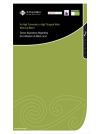Te Puni Kōkiri commissioned case study research to improve its knowledge base about land utilisation and identify areas of improvement in current regulatory regimes so as to promote Māori land utilisation. The report, “Owners’ Aspirations Regarding the Utilisation of Māori Land”, sought to identify the aspirations that Māori have for their land and how these can best be supported.
Purpose
This report has been prepared to improve the evidence base for considering reforms to the regulatory framework, by considering:
• What are Māori aspirations for their Māori land?
• How are these aspirations expressed and communicated to other owners and more widely?
• What are the enablers and barriers to these aspirations?
• Are aspirations being realised, and if so, to what extent?
It arises from the work associated with the Māori Land Tenure Review undertaken by Hui Taumata and draws on a number of case studies to provide rich descriptive data responding to these questions. It also identifies a number of issues that might usefully be considered in any review of the regulatory framework. In identifying these issues, it also draws on analysis of TTWMA and a number of earlier reviews.
Methodology
Te Puni Kōkiri directed that the research be conducted initially as a series of case studies. The aim was to gather data from multiple perspectives to provide descriptive data about:
• the range of aspirations for Māori land owners for their land across a range of contexts
• how these aspirations have been developed by and communicated to the ownership
• the enablers and/or barriers to these aspirations being realised
• management structures – what management structures (formal or informal) are in place to manage the land and facilitate decision making
• occupation and utilisation – how these complement or inhibit aspirations for land
• regulatory regime – how the current regulatory regime contributes to or inhibits the achievement/development of aspirations.

